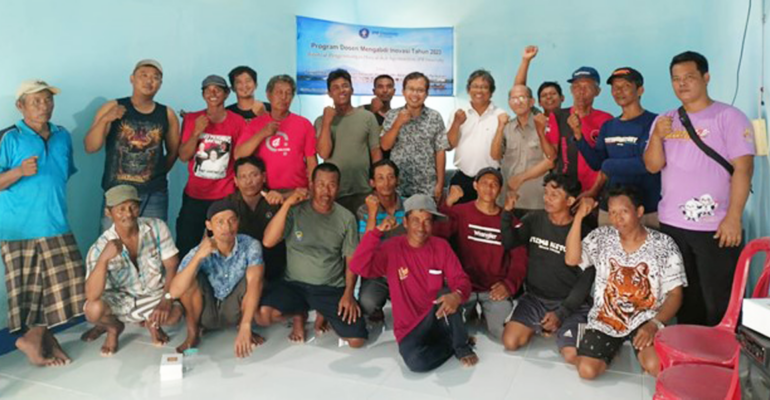IPB University Innovation Service Lecturer Trains Cirebon Fishermen to Develop Three Pillars of Sustainable Fisheries

The IPB University Innovation Serving Lecturer Team consisting of Dr Mustaruddin, Prof Gondo Puspito, and Prof Mulyono held training and socialization of the concept of sustainable fisheries management to fishermen and fishing communities in Citemu Village, Cirebon, West Java.
There are three pillars of the sustainable fisheries concept raised, namely stock enrichment, development of technology and environmentally friendly fishing principles as well as development of partnerships to strengthen fisheries businesses.
Previously, surveys were carried out to obtain information about the types of fish caught by fishermen and the locations where they were caught. Based on information from the Kejawanan Archipelago Fisheries Port (PPN), the squid group is the type most frequently caught currently with fishing locations around Cirebon waters. Other types are kite, layur, and kembung. Apart from that, sales of caught fish are still carried out to baskets so the selling price is still determined by other parties.
At the training (6/12), the IPB University Innovation Serving Lecturers team presented the techniques for stock enrichment using a squid attractor. The attractor can attract squid to lay eggs and attach them to the attractor’s tassel line, thereby forming a new population and inviting other types of fish.
The training continued with an explanation of environmentally friendly fishing technology and principles by Prof Gondo Puspito, an expert in fishing equipment technology at the Department of Fisheries Resource Utilization (PSP), Faculty of Fisheries and Marine Sciences (FPIK) IPB University.
Prof Gondo explained that fishing results can be increased without causing damage to the aquatic ecosystem, namely by modifying the structure of fishing gear, installing assistive equipment, and modifying fishing operation techniques.
This modification is effective for folding traps, trammel nets, and gill nets. Gill nets can increase fish catches by regulating the number of attractor lights and the intensity of the lighting, even though they are operated silently. Surreptitious operations can reduce damage to aquatic ecosystems by fishing gear, making it more environmentally friendly.
“Fishing gear modifications need to be accompanied by changes in views and principles in carrying out fishing operations. “Fishing gear becomes destructive if in its operation we are greedy and want to catch anything and destroy fish habitat to get maximum catches,” said Prof Gondo.
This activity involved partners from the Mina Mandiri Jaya Cooperative and Citemu Village officials. In the partnership development session, Dr Mustaruddin stated that strengthening fishermen’s partnerships could ensure the sustainability of fisheries businesses. Not only in terms of fishing operations but also in marketing the caught fish. Fishermen will get price certainty and a wider marketing reach.
“This partnership can develop fisheries through fisheries cooperatives, industry, restaurants, and fishery export players. “Partners provide capital and technology assistance and fishermen supply fish and even become part-time workers or distributors,” said Dr Mustaruddin, who actively teaches at the PSP Department of IPB University.
Halim, Chairman of the Mina Mandiri Jaya Cooperative welcomed the idea. He plans several business fields involving fishermen or developing fishing families.
“We are grateful to know that there are many efforts that can be made to maintain our jobs as fishermen. “This can be done by enriching fish stocks, modifying fishing gear, even by building partnerships that strengthen our position as fishermen,” said Sutirno, one of the fishermen figures in Citemu Village.
During the activities of Lecturers Serving Innovation, the Sustainable Fisheries Partnership Institute was also formed. The management of this partnership institution consists of five people, namely the chairman (Sutirno), deputy chairman (Halim), and three field coordinators (Wasna, Muhajir, and Pera).
Dr Mus explained that this institution is a collective forum for fishermen to voice the principles of sustainable fisheries management while strengthening the position of fishermen in building partnerships with industry, investors, and others.
“This institution is under monitoring and training of the IPB University Innovation Service Lecturers team, so that various future service programs in Cirebon will be targeted at the Sustainable Fisheries Partnership Institute,” he said. (*/Rz) (IAAS/Res)



